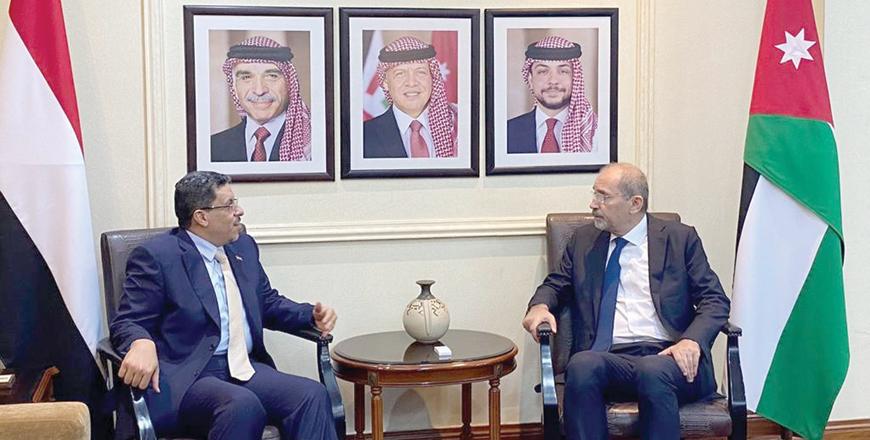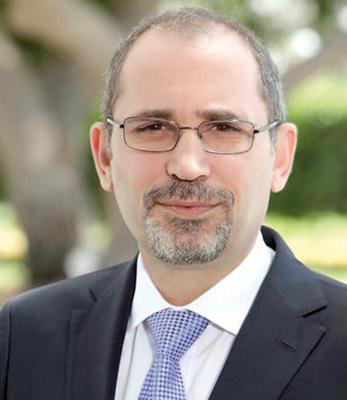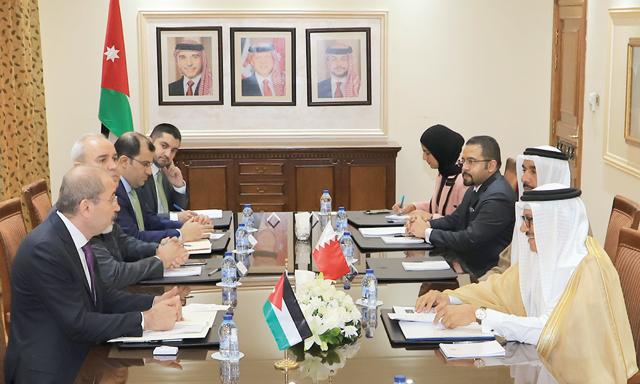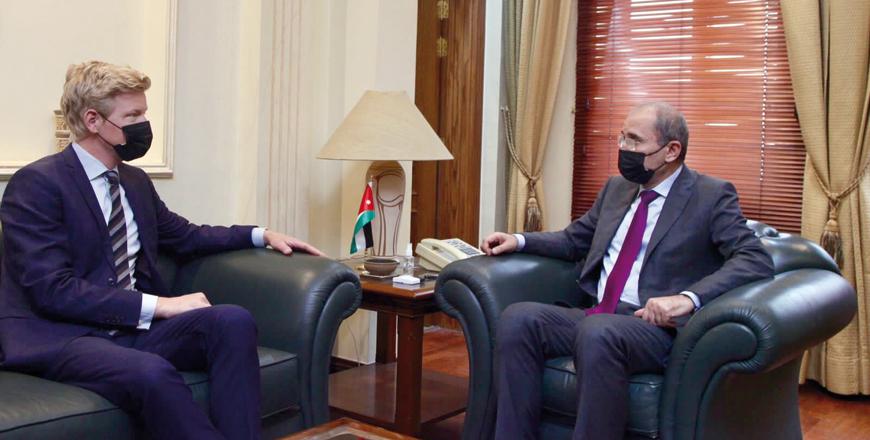You are here
FM reiterates Jordan’s support for Yemen’s stability
By JT - Aug 08,2022 - Last updated at Aug 08,2022

Deputy Prime Minister and Foreign Minister Ayman Safadi meets with Yemeni Foreign Minister Ahmed Awad Bin Mubarak on Monday (Photo courtesy of Foreign Ministry)
AMMAN — Deputy Prime Minister and Foreign Minister Ayman Safadi on Monday met with Yemeni Foreign Minister Ahmed Awad Bin Mubarak, discussing bolstering cooperation in various fields.
During the meeting, the two ministers also discussed a number of regional issues, foremost of which is the Palestinian cause, according to a Foreign Ministry statement.
Safadi affirmed Jordan’s welcoming of the armistice, according to which the aggression in the Gaza Strip was ceased.
The Jordanian foreign minister condemned all violations committed at Al Aqsa Mosque/Al Haram Al Sharif.
Warning of the consequences of “the continued absence of a political horizon”, Safadi called for effective international action to resolve the conflict on the basis of the two-state solution.
The two sides also reviewed efforts exerted to end the Yemeni crisis and restore security and stability in Yemen.
In this regard, Safadi voiced Jordan’s pride in its relations with Yemen, stressing that the Kingdom continues to support Yemen and its stability.
Safadi stressed that the Kingdom welcomed the extension of the truce in Yemen for two additional months, which was announced a week ago.
The Kingdom supports international efforts and endeavours to resolve the Yemeni crisis, he said, underlining Jordan’s continued support for the UN mission in Yemen, which is based in Amman.
He stressed the need to intensify efforts to reach a political solution that ends the Yemeni crisis and guarantees the unity and territorial integrity of Yemen.
In turn, Bin Mubarak expressed appreciation towards the Kingdom’s main role, under the leadership of His Majesty King Abdullah, in establishing security and stability in the region, lauding the Kingdom’s support for the Yemeni people.
Following their talks, the two ministers signed a memorandum of understanding to strengthen bilateral relations and establish a political consultation mechanism between the two foreign ministries.
In joint press statements, Safadi shed light on the historical relations between the two countries and their continuous cooperation to serve common interests.
Referring to their extensive discussions on the situation in Yemen, Safadi stressed the need to adhere to the truce, “especially in regard to opening roads to Taiz”.
“We hope that this truce will be a step towards reaching a full political solution based on the UN Security Council Resolution 2216 and accredited references, including the Gulf initiative and its implementation mechanisms, and the outcomes of the National Dialogue Conference,” he added.
Hosting the UN Mission to Yemen, Jordan has served as a venue for meetings which aim to address a number of issues, including prisoners, opening roads and others to cement the armistice and search for a political solution to the crisis, Safadi said.
“The Yemeni crisis has caused a lot of suffering, and we believe that there is no alternative to a political solution that comes in accordance with references stipulating means to resolve this crisis, so that Yemen can restore its security and stability, and take steps towards the path of reconstruction,” he added.
The Jordanian foreign minister described selecting the Presidential Leadership Council as “an important step”.
“We cherish our relations with brotherly Yemen, and we continue to support Yemeni legitimacy in order to reach the desired goals concerned with ending the crisis,” Safadi said.
Focusing on the need to stop all terrorist attacks on Arab Gulf states, Safadi said: “We have always emphasised, and as His Majesty the King has always emphasised that the security and stability of the Gulf is part of our security, and we stand with our brothers in any step they take in order to protect their interests.”
Turning to FSO Safer, the Yemeni oil tanker, Safadi said: “The Safer is an environmental disaster waiting to happen; therefore, efforts must be intensified in a more practical and effective way to avoid this disaster,” Safadi said.
The international community must be informed of the danger posed by the failure to resolve the Safer case, he stressed.
As for bilateral cooperation, Safadi said: “There will soon be meetings of technical committees to determine prospects for cooperation, and to agree on practical steps towards increasing cooperation, especially since Jordan has recently provided a travel destination for our Yemeni brothers.”
“About 7,000 Yemeni brothers have come to Jordan since the signing of the armistice, and Jordan continues to provide all support to Yemen,”Safadi added.
Turning to the Palestinian cause, Safadi welcomed the truce according to which the recent Israeli aggression in the Gaza Strip was stopped, valuing the Egyptian role in materialising the truce.
Safadi also extended thanks to Qatar and the US for their efforts in stopping the Israeli aggression and restoring security and calm to the Gaza Strip.
“This aggression came as a reflection of a situation that cannot continue,” Safadi said, adding that “every year and every month, we find ourselves facing a new outbreak of violence. This is due to the absence of a basic solution, which is the two-state solution that embodies the independent Palestinian state with Jerusalem as its capital on the lines of June 4, 1967”.
He described the two-state solution as “the only way to resolve the conflict”.
Safadi warned of “the absence of a political horizon”, calling for a halt to all unilateral steps that undermine the two-state solution and condemning the continuation of violations.
Urging to respect the historical and legal status quo in Al Aqsa Mosque/Al Haram Al Sharif, he said that “Al Aqsa Mosque/Al Haram Al Sharif, with its total area of 144 dunums, is a place of worship for Muslims alone, in accordance with international resolutions”.
“What we have seen during the past days, once again, was a message to the entire international community that the absence of a political horizon cannot continue, and we call, as we have always called, for an immediate return to serious and effective negotiations to achieve peace on the basis of the two-state solution,” he said.
Jordan continues to coordinate with the Palestinian National Authority, Arab countries, the US, the EU, and the international community in order to “find a real political horizon that achieves real peace and prevents conflict from erupting again and again, as an inevitable result of the existing situation, which is characterised by an absence of prospects for a just and comprehensive peace”.
In turn, Bin Mubarak expressed delight to be in Jordan on his official visit, thanking the Jordanian side for its good organisation and the warm welcome.
“On behalf of all people in Yemen, and on behalf of the Presidential Leadership Council, we extend our appreciation and thanks to our people in Jordan, the King, the government and people for everything they have done and are doing throughout the last period,” the Yemeni foreign minister said.
Describing the Yemeni-Jordanian relations as “historical”, Bin Mubarak highlighted the two countries’ common bonds, history and interests.
"Jordan has played a very important role during the past period,” he said, adding that the Kingdom has hosted “a large number of Yemeni internal dialogues and many regional meetings through the UN envoy’s office,” he said.
Underlining constant coordination with Safadi, Bin Mubarak referred to the two countries’ common stances.
“Jordan supports a peaceful political solution in Yemen based on the three references: International Resolution 2216, the Gulf Initiative, and the outcomes of the national dialogue, which is what we want as Yemenis,” he said.
The Yemeni minister referred to his visit as an important step “towards institutionalising this sincere brotherly cooperation between Jordan and Yemen”, noting that “Jordan has always been a hospitable and welcoming country, and Yemenis have always been welcome in Jordan”.
During the meeting, the two sides discussed preparations for convening of the Higher Ministerial Committee meeting as well as the upcoming visit of President of the Presidential Leadership Council Rashad Al Alimi to Jordan, Bin Mubarak said.
In regard to the reopening of Sanaa Airport, Bin Mubarak said Yemen has initially contacted Jordan which exerted “special personal and institutional effort” to facilitate the reopening.
The reopening served as a relief to Yemeni people in areas controlled by the Houthi militia, he added.
The war was imposed on Yemen by the Houthi militia’s coup against the Yemeni majority, he noted, describing the recent truce, which was renewed for the third time, as an opportunity to be taken advantage of to restore stability.
Related Articles
AMMAN — Deputy Prime Minister and Foreign Minister Ayman Safadi on Saturday received a phone call from Yemeni Foreign Minister Ahmed Bin Mub
AMMAN — Deputy Prime Minister and Foreign Minister Ayman Safadi on Tuesday met Bahraini Foreign Minister Abdullatif bin Rashid Al Zayani, to
AMMAN — Deputy Prime Minister and Foreign Minister Ayman Safadi and UN Secretary General's Special Envoy for Yemen Hans Grundberg on Monday



















